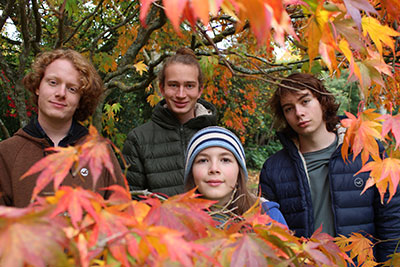Applied Behaviour Analysis (ABA) may lead to improvements in everyday life skills and intelligence, according to a new study.
An international team of researchers based in the UK, US, Israel, Australia and Norway, compared the therapy for pre-school children with other interventions.

The four Ziegel boys: (left to right) Benjamin, Thomas, Hector and Marcus, who have all had ABA therapy
The review analysed data from 491 children involved in ten studies.
It found that children on ABA saw greater improvements in their intelligence and everyday life skills at two years old.
Mark Rodgers, of York University, is one of the researchers involved.
ABA results ‘variable’
Despite the apparent improvements he said the research methods in the ten studies analysed were often “poor quality”.
The results were “variable” and there was little to say what happened to the children later.
Mum-of-four Sarah Ziegel put all her children on ABA programmes. She has four sons: twins Thomas and Benjamin, 21, Hector, 19, and Marcus, 12.
She said it has made a “huge” difference to their lives and is a passionate advocate for the therapy.
All four boys were diagnosed with classic non-verbal autism aged two. But now Ziegel says they have made great progress with language and daily living skills.
Author of A Parent’s Guide to Coping with Autism, Ziegel, from London, said her children “exceeded all expectations”.
Positive behaviours through rewards
ABA attempts to build positive behaviours, such as language skills, through rewards.
They argue that it is empowering for non-verbal autistic people to learn such skills as the ability to talk.
Language is a big issue in autism, as an estimated four in ten people with the condition are non-verbal.
But the therapy has critics in the neurodiversity movement.
Neurodiversity groups such as Autistic UK say social acceptance would help autistic people far more than ABA.
The movement says ABA is abusive because it’s a “normalising” therapy that attempts to suppress autism. They argue that autism is a difference and not a disability.
The new study appeared in the journal Autism.
Related:
Published: 6 February 2021















